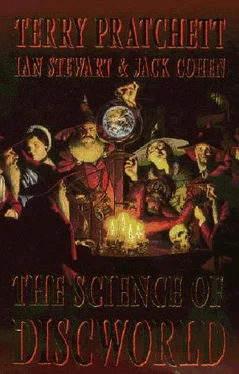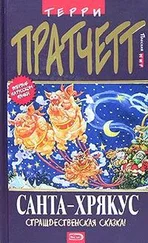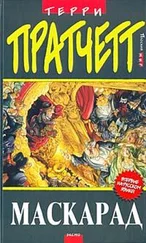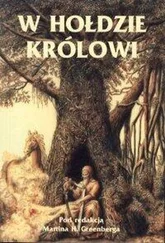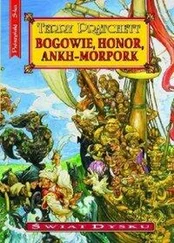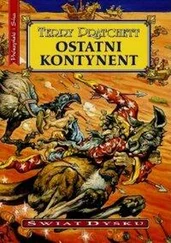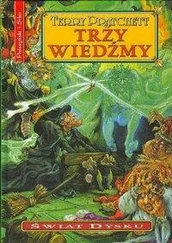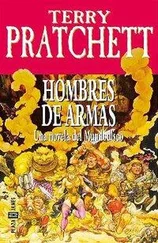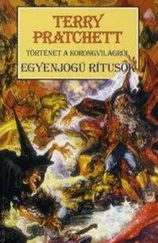Terry Pratchett - Science of Discworld
Здесь есть возможность читать онлайн «Terry Pratchett - Science of Discworld» весь текст электронной книги совершенно бесплатно (целиком полную версию без сокращений). В некоторых случаях можно слушать аудио, скачать через торрент в формате fb2 и присутствует краткое содержание. Жанр: Фантастика и фэнтези, на английском языке. Описание произведения, (предисловие) а так же отзывы посетителей доступны на портале библиотеки ЛибКат.
- Название:Science of Discworld
- Автор:
- Жанр:
- Год:неизвестен
- ISBN:нет данных
- Рейтинг книги:4 / 5. Голосов: 1
-
Избранное:Добавить в избранное
- Отзывы:
-
Ваша оценка:
- 80
- 1
- 2
- 3
- 4
- 5
Science of Discworld: краткое содержание, описание и аннотация
Предлагаем к чтению аннотацию, описание, краткое содержание или предисловие (зависит от того, что написал сам автор книги «Science of Discworld»). Если вы не нашли необходимую информацию о книге — напишите в комментариях, мы постараемся отыскать её.
Science of Discworld — читать онлайн бесплатно полную книгу (весь текст) целиком
Ниже представлен текст книги, разбитый по страницам. Система сохранения места последней прочитанной страницы, позволяет с удобством читать онлайн бесплатно книгу «Science of Discworld», без необходимости каждый раз заново искать на чём Вы остановились. Поставьте закладку, и сможете в любой момент перейти на страницу, на которой закончили чтение.
Интервал:
Закладка:
'Tadpoles are fish,' said the Bursar.
'But a tadpole knows it's going to be a frog,' said Ridcully patiently. 'There's no narrativium on this world. That fish couldn't be saying to itself "Ah, a new life beckons on dry land, walking around on things I haven't yet got a name for."' No, either the planet is somehow generating new life, or we're back to the old "hidden gods" theory.'
'It's all gone wrong, you know,' said the Dean. 'It's the bloodi-mindium. Even gods couldn't control this place. Once there's life, there's complete and utter chaos. Remember that book the Librarian brought back? It's a complete fantasy! Nothing seems to happen like that at all! Everything just does what it likes!'
'Progress is being made,' said Ponder.
'Big amphibians?' sneered the Senior Wrangler. 'And things were going so well in the sea. Remember those jellyfish that made nets? And the crabs even had a flourishing land civilization! They had practically got a culture!'
'They ate captured enemies alive' said the Lecturer in Recent Runes, patiently.
'Well... yes. But with a certain amount of etiquette, at least,' the Senior Wrangler admitted. 'And in front of their sand statue of the Great Big Crab. They were obviously attempting to control their world. And what good did it do them? A million tons of white hot ice smack between the eyestalks. It's so upsetting.'
Terhaps they should have eaten more enemies,' said the Dean.
Terhaps sooner or later the pknet will get the message,' said Ridcully.
'Time for the giant whelks, perhaps?' said the Lecturer in Recent Runes, hopefully.
'Big newts is what we've got right now,' said Ridcully. He glanced at the Dean and Senior Wrangler. Ridcully hadn't maintained his position atop the boiling heap of UU wizardry without a little political savvy. 'And newts, gentlemen, might be the way to go. Amphibians? At home in the water and on land? The best of both worlds, I fancy.'
The two wizards exchanged sheepish glances.
'Well ... I suppose ...' said the Senior Wrangler.
'Could be,' the Dean said grudgingly. 'Could be.'
'There we are then,' said Ridcully happily. 'The future is newt.'
NINE TIMES OUT OF TEN
THERE'S NO NARRATIVIUM ON THIS WORLD.'
Let's take a step away from the unfolding ancestral tale of The Fish That Came Out From The Sea and look at a more philosophical issue.
The wizards are puzzled. On Discworld, things happen because narrative imperative makes them happen. There is no choice about ends, only about means. The Lecturer in Recent Runes is trying to make a sustainable lifeform happen. He thinks that the obstacle to sustainability is the fragility of life, so the only way he can see to achieve this is the two-mile limpet, proof against everything the sky can drop on it.
It never occurs to him that lifeforms might achieve sustainability by other, less direct methods, despite the evidence of his eyes that suggests that a dogged tenacity appears to allow life to arise in the most inhospitable environment, effectively re-creating itself over and over again. The wizards are torn between evidence that a planet is the last place you'd choose to create life, and evidence that life doesn't agree.
On Discworld, it is clearly recognized that million-to-one chances happen nine times out of ten. The reason is that every Discworld character lives out a story, and the demands of the story determine how their lives unfold. If a million to one chance is required to keep that story on track, then that's what will happen, appalling odds notwithstanding. On Discworld, abstractions generally show up as things, so there is even a thing, narrativium, that ensures that everybody obeys the narrative imperative. Another personification of the abstract, Death, also makes sure that each individual's story comes to an end exactly when it's supposed to. Even if a character tries to behave contrary to the story in which they find themselves, narrativium makes sure that the end result is consistent with the story anyway.
What's puzzling the wizards is that our world isn't like that ...
Or is it?
After all, people live on our world too, and it's people that drive stories.
As case in point, a story about people who drive. The setting is Jerez Grand Prix circuit, last race of the 1997-98 Formula One motor racing season ... Ace driver Michael Schumacher is one Championship point ahead of arch-rival Jacques Villeneuve. Villeneuve's team-mate Heinz-Harold Frentzen may well play a crucial tactical role. The drivers are competing for 'pole position' on the starting grid, which goes to whoever produces the fastest lap in the qualifying sessions. So what happens? Unprecedentedly, Villeneuve, Schumacher, and Frentzen all lap in 1 minute 21.072 seconds, the same time to a thousandth of a second. An amazing coincidence.
Well: 'coincidence' it surely was, the lap times coincided. But was it truly amazing?
Questions like this arise in science, too, and they're important. How significant is a statistical cluster of leukaemia cases near a nuclear installation? Does a strong correlation between lung cancer and having a smoker in the family really indicate that secondary smoking is dangerous? Are sexually abnormal fish a sign of oestrogen-like chemicals in our water supply?
A case in point. It is said that 84% of the children of Israeli fighter pilots are girls. What is it about the life of a fighter pilot that produces such a predominance of daughters? Could an answer lead to a breakthrough in choosing the sex of your children? Or is it just a statistical freak? It's not so easy to decide. Gut feelings are worse than useless, because human beings have a rather poor intuition for random events. Many people believe that lottery numbers that have so far been neglected are more likely to come up in future. But the lottery machine has no 'memory', its future is independent of its past. Those coloured plastic balls do not know how often they have come up in previous draws, and they have no tendency to compensate for past imbalances.
Our intuition goes even further astray when it comes to coincidences. You go to the swimming baths, and the guy behind the counter pulls a key at random from a drawer. You arrive in the changing room and are relieved to find that very few lockers are in use ... and then it turns out that three people have been given lockers next to yours, and it's all 'sorry!' and banging locker doors together Or you are in Hawaii, for the only time in your life ... and you bump into the Hungarian you worked with at Harvard. Or you're on honeymoon camping in a remote part of Ireland ... and you and your new wife meet your Head of Department and his new wife, walking the other way along an otherwise deserted beach. All of these have happened to Jack.
Why do we find coincidences so striking? Because we expect random events to be evenly distributed, so statistical clumps surprise us. We think that a 'typical' lottery draw is something like 5, 14, 27, 36, 39,45, but that 1,2, 3,19,20,21 is far less likely. Actually, these two sets of numbers have exactly the same probability: 1 in 13,983,816. A typical lottery draw often includes several numbers close together, because sequences of six random numbers between 1 and 49 are more likely to be clumpy than not.
How do we know this? Probability theorists tackle such questions using 'sample spaces', their name for what we earlier called a 'phase space', a conceptual 'space' that organizes all the possibilities. A sample space contains not just the event that concerns us, but all possible alternatives. If we are rolling a die, for instance, then the sample space is 1, 2, 3, 4, 5, 6. For the lottery, the sample space is the set of all sequences of six different numbers between 1 and 49. A numerical value is assigned to each event in the sample space, called its 'probability', and this corresponds to how likely that event is to happen. For fair dice each value is equally likely, with a probability of 1/6. Ditto for the lottery, but now with a probability of 1/13,983,816.
Читать дальшеИнтервал:
Закладка:
Похожие книги на «Science of Discworld»
Представляем Вашему вниманию похожие книги на «Science of Discworld» списком для выбора. Мы отобрали схожую по названию и смыслу литературу в надежде предоставить читателям больше вариантов отыскать новые, интересные, ещё непрочитанные произведения.
Обсуждение, отзывы о книге «Science of Discworld» и просто собственные мнения читателей. Оставьте ваши комментарии, напишите, что Вы думаете о произведении, его смысле или главных героях. Укажите что конкретно понравилось, а что нет, и почему Вы так считаете.
